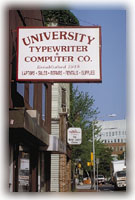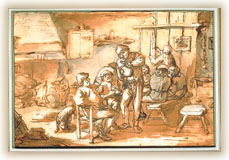![]()
Main Menu ·
Search ·
Current Issue · Contact · Archives · Centennial · Letters to the Editor · FAQs
![]()
Main Menu ·
Search ·
Current Issue · Contact · Archives · Centennial · Letters to the Editor · FAQs

| ANIMALS AND THE BAR: Questions about the status of animals arise not only in biomedical settings (see "Animal Research," the January-February cover article), but also, increasingly, in law. Next spring, Harvard Law School students can explore these issues in a course, "Animal Rights Law," taught by lecturer Steven M. Wise, past president of the Animal Legal Defense Fund. Since the mid 1980s, Wise's private practice has focused on animal-related litigation, and he is the author of a forthcoming book, Rattling the Cage: Toward Legal Rights for Animals. Animals now enjoy certain legal protections against abuse, but not legal rights; in the course, Wise proposes to explore "whether legal rights should be limited to humans and, if not, what nonhuman animals should be entitled to them under the common law, and to which legal rights." Students will consider in detail "the arguments for and against the entitlement of chimpanzees and bonobos to the common-law rights to bodily integrity and bodily liberty." |
Quant Courses
The quantitative reasoning component of the undergraduate Core Curriculum, approved by the Faculty of Arts and Sciences in May 1997, debuts this year with a half-dozen courses. In the fall, philosopher Warren Goldfarb, Pearson professor of modern mathematics and mathematical logic, offers "Deductive Logic." David Cutler, professor of economics and Loeb professor of social sciences, looks at "Health Economics," including medical-services markets,
Mount Auburn Makeover
 Tenants, current and former, soon to vanish from Mount Auburn Street
Tenants, current and former, soon to vanish from Mount Auburn Street |
Nota Bene
Law lecturer. After serving two terms as attorney general of Massachusetts, Scott Harshbarger '64, LL.B. '68, returns to the law school this fall as a visiting professor of law from practice. Harshbarger, who narrowly lost the gubernatorial election last November, is also a visiting professor at Northeastern University. He will have to commute to his classes: in late July, he was elected president of Common Cause, in Washington, D.C.
Professorial pay. An American Association of University Professors salary survey puts Harvard near the top of the academic pay scale. Harvard full professors earned an average of $122,100 in the 1998-1999 school year, behind only their colleagues at Rockefeller University. Among assistant professors, the Harvardians ranked seventh, at $63,800.
 DUTCH MASTERS: George S. Abrams '54, LL.B. '57, and Maida Stocker Abrams have given 110 seventeenth-century Dutch drawings, worth an estimated $20 million, to the Fogg Art Museum. The works, including examples by Pieter Breughel the Elder and Rembrandt, were selected from holdings--assembled by the Abramses over the past 40 years--considered the most comprehensive private collection of such art in the world. The couple previously gave nearly 100 other drawings to the Fogg (see "Dutch Treats," September-October 1992, page 41). In recognition of their long-term support, James Cuno, Cabot director of the Harvard University Art Museums, announced that the Fogg's collection is now overseen by the Maida and George Abrams curator of drawings; William W. Robinson has been curator since 1988. One of the newly donated prints, Peasants Drinking at an Inn by Adriaen van Ostade, is shown here. HARVARD UNIVERSITY ART MUSEUMS
DUTCH MASTERS: George S. Abrams '54, LL.B. '57, and Maida Stocker Abrams have given 110 seventeenth-century Dutch drawings, worth an estimated $20 million, to the Fogg Art Museum. The works, including examples by Pieter Breughel the Elder and Rembrandt, were selected from holdings--assembled by the Abramses over the past 40 years--considered the most comprehensive private collection of such art in the world. The couple previously gave nearly 100 other drawings to the Fogg (see "Dutch Treats," September-October 1992, page 41). In recognition of their long-term support, James Cuno, Cabot director of the Harvard University Art Museums, announced that the Fogg's collection is now overseen by the Maida and George Abrams curator of drawings; William W. Robinson has been curator since 1988. One of the newly donated prints, Peasants Drinking at an Inn by Adriaen van Ostade, is shown here. HARVARD UNIVERSITY ART MUSEUMS |
ADAPT adapts. Project ADAPT, the University's multiyear effort to modernize its computer and information systems for financial and human-resources administration, has new leadership. Peter Segall, who had run the project since September 1997, resigned July 30 to join Universal Learning Technologies, which provides Internet-based course-management software for colleges and universities. The complexity of integrating the computer systems of Harvard's diverse units, and the difficulty of hiring and retaining information-systems personnel, have made ADAPT a formidable undertaking. Three outside vendors--KPMG, Oracle, and now Sapient--have been retained, in turn, to work on the project. Several ADAPT products--a general ledger and chart of accounts; travel and purchasing systems--have been phased in or began functioning at the start of the new fiscal year on July 1. Others are due to come on line in the next several years. Sara Oseasohn will serve as acting executive director.
Women and religion. The Divinity School has named Leila Ahmed, BI '86, its first professor of women's studies in religion. Formerly a professor at the University of Massachusetts-Amherst, Ahmed is the author of Women and Gender in Islam: The Historical Roots of a Modern Debate and A Border Passage: From Cairo to America--A Woman's Journey. She has served since 1992 on the advisory board of the divinity school's women's studies in religion program, which has hitherto relied on visiting scholars.
Cancer fighter. Patricia (Conn) Ganz '69 is the first woman to receive the American Cancer Society's most prestigious research grant, a five-year, $300,000 clinical research professorship. She will continue to investigate women at high risk for breast cancer and the quality of life among cancer survivors. A professor in UCLA's schools of medicine and public health, Ganz directs the division of cancer prevention and control research at its Jonsson Cancer Center.
A moderate, murdered. Neelan Tiruchelvam, LL.M. '70, S.J.D. '73, a member of the Sri Lankan parliament who was to have served as a visiting professor at the Law School this fall, was murdered by a suicide-bomber in Colombo on July 29. A member of the Tamil United Liberation Front, he had been involved in constitutional reform aimed at resolving his country's bitter 16-year civil war between the Tamils and the majority Sinhalese.
Main Menu ·
Search · Current Issue · Contact · Archives · Centennial · Letters to the Editor · FAQs
![]()